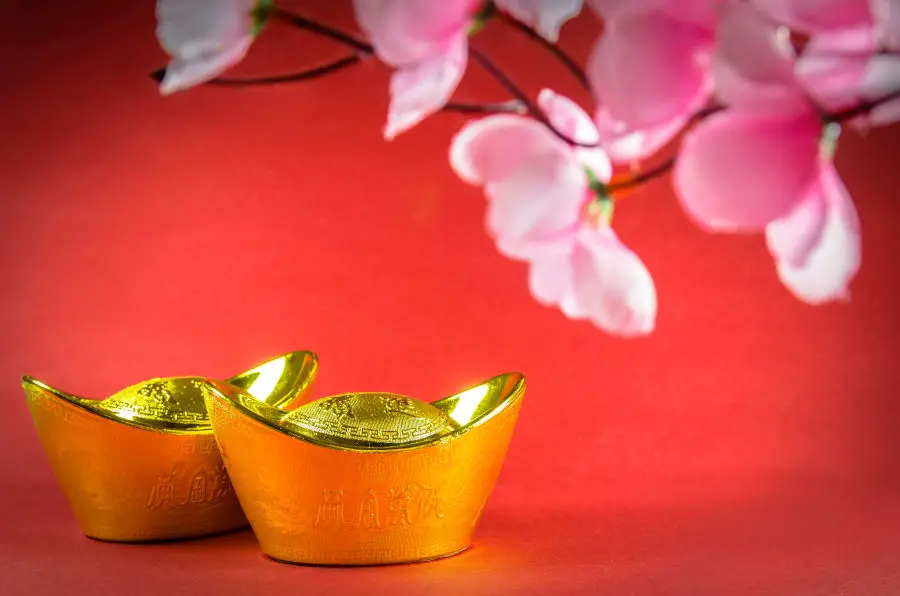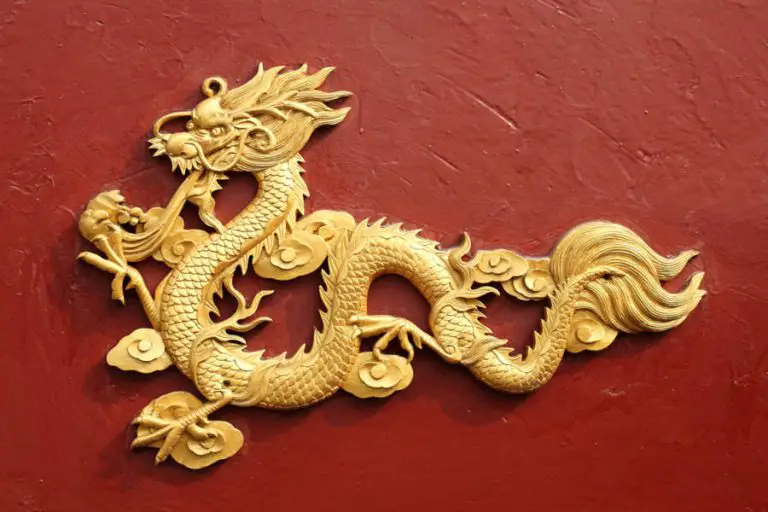A Yuanbao (剃帝), which is also known as a Wealth Ingot, is an ancient form of money that has become a strong sign of wealth in Chinese society. Typically shaped like a boat, the Yuanbao has a flat base and a rounded top that is said to symbolize the flow of riches.
Historically, especially before the current currency system was developed, these ingots—made from precious metals like gold and silver—were used as a medium of commerce.
The Yuanbao’s design is more than merely practical; it also has significant symbolic importance. The boat form represents abundance and the capacity to overcome life’s obstacles to achieve financial success. In modern Feng Shui, Yuanbao is frequently employed to increase good fortune and draw riches to residences and enterprises.
The Rich History Behind Yuanbao Ingots
The history of Yuanbao dates back to ancient China, where it was utilized as a form of currency from the Qin Dynasty (221–206 BC) until the end of the Qing Dynasty in the early 20th century. “Yuanbao” (元宝) is associated with the term “sycee,” (细 丝) which refers to various forms of gold and silver ingots used throughout Chinese history.
During the Ming (1368–1644) and Qing Dynasties (1644–1912), the use of Yuanbao became more standardized yet remained highly variable due to individual craftsmanship. While coins became more prevalent, especially during the Ming Dynasty when paper money began to emerge as a dominant form of currency, Yuanbao continued to serve as a significant medium for high-value transactions.
In this era, Yuanbao was not only a practical currency but also symbolized wealth and status among the elite. High-ranking officials often used these ingots in ceremonial contexts or as offerings to deities, further embedding them within the cultural fabric of Chinese society. The craftsmanship of Yuanbao also reached new heights during this time, with intricate designs and markings that indicated their authenticity and value.
How Yuanbao Was Used in Traditional Trade
In ancient Chinese trade, Yuanbao ingots played a crucial role in facilitating large-scale transactions. Unlike coins, which were used for everyday purchases, Yuanbao were reserved for higher-value exchanges, such as trading goods like silk, tea, and spices.
Merchants would carry these ingots across long distances along trade routes such as the Silk Road, as they were easily recognizable and widely accepted. Each Yuanbao was often weighed meticulously to determine its exact value, with gold ingots naturally holding more worth than silver.
Their distinctive shape also allowed them to be quickly identified by weight and quality, streamlining transactions. In addition to commerce, Yuanbao was used for paying taxes and settling debts, further solidifying its status as a symbol of wealth and economic power.
The Role of Yuanbao in Chinese Mythology
In Chinese mythology, the Yuanbao is often at the center of legendary stories that emphasize its connection to wealth and good fortune. One well-known tale involves the God of Wealth (Cai Shen), who is believed to have descended from the heavens, scattering Yuanbao to bless the people with prosperity.
According to legend, those who found these sacred ingots were granted not only wealth but also lifelong good luck. In another story, a poor but kind-hearted man discovers a Yuanbao during a time of famine, which miraculously multiplies each night, allowing him to feed his family and his entire village.
These legends highlight the Yuanbao as a magical object capable of multiplying wealth and bringing fortune to those deemed worthy by the gods.
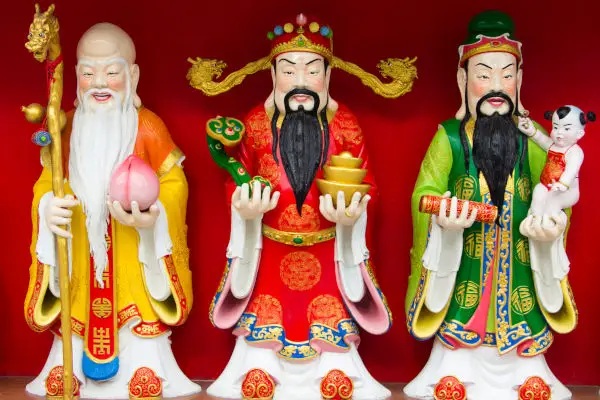
Yuanbao and the Gods of Wealth in Chinese Mythology
In Chinese mythology, the Yuanbao is closely associated with the Gods of Wealth, particularly Cai Shen, one of the most prominent deities invoked for financial success. Cai Shen is often depicted holding or surrounded by Yuanbao, symbolizing his divine ability to bring wealth and abundance.
The Yuanbao is not merely a token in his hand but a representation of his power to create prosperity for his followers. During the Chinese New Year, offerings of Yuanbao replicas are made to Cai Shen in hopes of securing financial blessings for the coming year.
Other deities, such as Zhao Gongming and Bi Gan, are also linked to Yuanbao in their roles as protectors of wealth and prosperity, further deepening the symbolic connection between these ingots and the divine realm of fortune.
Yuanbao in Religious Practices
Yuanbao plays a significant role in offerings made at temples and shrines across China. Devotees often present gold or silver Yuanbao replicas as a gesture of respect and gratitude to deities, especially those associated with wealth and prosperity, like the God of Wealth. These offerings symbolize the worshipper’s desire to receive blessings of financial success and stability in return.
In some temples, large displays of Yuanbao replicas are set up around altars, further emphasizing their importance in religious devotion. The act of offering Yuanbao is seen not only as a way to attract wealth but also as a means of fostering spiritual growth by cultivating generosity and humility.
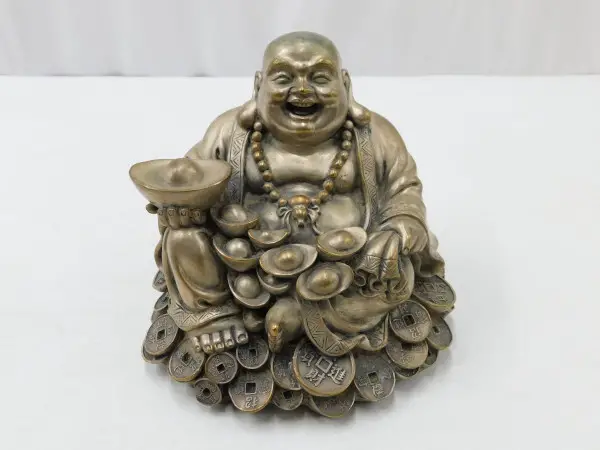
Yuanbao’s Role in Taoist and Buddhist Rituals
In Taoist and Buddhist practices, Yuanbao often holds symbolic meaning, particularly in rituals related to prosperity and the afterlife. In Taoism, Yuanbao is sometimes used in ceremonial rites to balance the flow of energy (qi), with the belief that its shape and symbolism can help harmonize one’s financial and spiritual life. Taoists also believe that offering Yuanbao during rituals can invite the blessings of wealth deities and ensure a smooth flow of prosperity.
In Buddhism, while less associated with direct wealth, Yuanbao is sometimes offered to Buddha statues or used in temple ceremonies during festivals as a symbol of abundance and the wish for all beings to be free from poverty.
The act of giving Yuanbao in Buddhist contexts aligns with the principle of Dana (charity or giving), reinforcing the idea that generosity leads to spiritual and material prosperity.
How Yuanbao Is Used in Ancestral Worship
Yuanbao also plays a key role in ancestral worship, a deeply rooted practice in Chinese culture. During ceremonies that honor deceased relatives, joss paper Yuanbao, often made from gold or silver-colored paper, is burned as an offering to ancestors. This act symbolizes providing wealth and comfort to loved ones in the afterlife.
The belief is that by offering these symbolic Yuanbao, the living can ensure their ancestors have all they need in the spiritual realm, which, in turn, will result in blessings and protection for the family.
This practice is especially common during Qingming Festival (Tomb-Sweeping Day) and Hungry Ghost Festival, where it’s believed that the ancestors’ well-being in the afterlife will bring good fortune to their descendants.

Yuanbao in Feng Shui
In feng shui, the Yuanbao is regarded as a powerful enhancer of wealth and good luck. Its unique shape, symbolizing fullness and abundance, makes it ideal for attracting prosperity and financial fortune into one’s life.
Feng shui practitioners often place Yuanbao in key areas of their homes or offices to activate wealth energy and ensure a constant flow of financial luck. Yuanbao can be placed in locations such as the wealth corner, typically found in the farthest left corner of a room from the entrance, which is known as the Xun position in feng shui’s Bagua map. This area is thought to govern prosperity, and adding Yuanbao here helps strengthen the flow of wealth and opportunities.
Another popular method is placing Yuanbao in pairs, symbolizing balance and harmony in financial matters. These pairs are often placed near windows or doorways to “catch” wealth as it enters the home.
In offices, Yuanbao can be placed on desks to attract business opportunities and success, particularly in the career and wealth aspects of life. The simple yet potent use of Yuanbao in feng shui rituals enhances not only material wealth but also positive energy, creating a harmonious environment for success and growth.
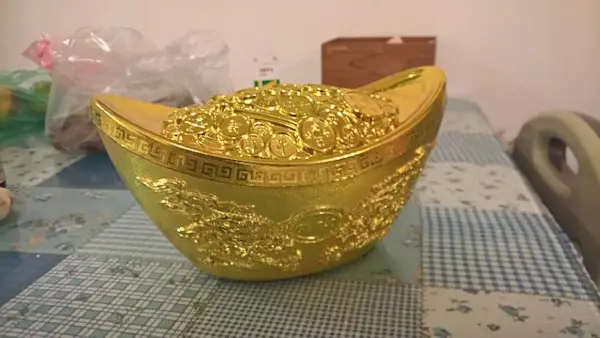
Popular Feng Shui Practices Involving Yuanbao
Yuanbao plays a prominent role in many feng shui practices aimed at boosting financial prosperity and overall good fortune. One common practice is using Yuanbao bowls—small, decorative bowls filled with replica Yuanbao ingots, often combined with other wealth symbols like Chinese coins and crystals.
These bowls are placed in strategic wealth areas to amplify the flow of financial energy. For example, a wealth bowl placed near the entrance of a home or office is believed to invite wealth in, ensuring that financial opportunities continually come through the door.
Another popular practice is using Yuanbao with wealth ships, an important symbol in feng shui. These ships are often filled with gold or silver Yuanbao, and they are positioned to look as though they are “sailing” into the home or office. This arrangement is said to ensure that wealth “sails” into your life smoothly and abundantly.
Additionally, placing Yuanbao in wealth vases is another effective way to accumulate and protect wealth. These vases are typically hidden in discreet areas of the home or office, symbolizing the quiet accumulation of financial resources.
Lastly, activating wealth with Yuanbao on important occasions is a widely practiced ritual. Many people will place Yuanbao in their homes or offices during the Chinese New Year to attract good luck and set a prosperous tone for the year ahead.
Combining these practices with other feng shui elements like water features or money trees creates a harmonious environment conducive to wealth and opportunity, strengthening the financial energy within the space.
Want to learn more about Feng Shui? Take a look at these Courses and Books – Aff.link
Yuanbao in Celebrations and Festivals
During Chinese New Year, Yuanbao takes on an especially prominent role as a symbol of wealth and prosperity. These golden ingots are used in various ways to invite fortune and good luck for the upcoming year.
Yuanbao decorations are commonly seen in homes, businesses, and public spaces, often displayed alongside red lanterns, couplets, and other auspicious symbols. Many people place replica Yuanbao on tables, shelves, or near entrances, believing they will attract financial blessings throughout the year.
A popular tradition involves giving Yuanbao-shaped items as gifts, particularly in red envelopes, which symbolize good luck and wealth. The Yuanbao shape, often seen on gold-foil chocolates, candies, or small ornaments, serves as a symbolic wish for the recipient’s financial success.
Additionally, Yuanbao are often used in festive meals, such as dumplings that are folded into shapes resembling the ingots, known as “Yuanbao Tang” (元寶湯), symbolizing “pockets full of wealth.” This practice not only adds to the festive atmosphere but also reinforces the belief that Chinese New Year celebrations should begin with the promise of abundance and prosperity.

How Yuanbao Is Used in Other Chinese Festivals
Beyond Chinese New Year, Yuanbao is also an important symbol in other significant Chinese festivals. During the Qingming Festival, which focuses on ancestral worship, paper Yuanbao is burned as offerings to honor deceased loved ones.
This ritual is meant to ensure that ancestors are well-provided for in the afterlife, and it strengthens the connection between the living and the dead. By offering Yuanbao, families hope their ancestors will, in turn, bring blessings and protection to their descendants.
Yuanbao is also featured during the Hungry Ghost Festival, another occasion where offerings are made to appease wandering spirits. Paper Yuanbao is burned alongside incense, food, and other symbolic items, reflecting the belief that these offerings will help wandering souls find peace and prevent them from causing harm to the living. In this context, Yuanbao symbolizes not only material wealth but also spiritual wealth, ensuring harmony between the earthly and spiritual realms.
During the Lantern Festival, which marks the end of Chinese New Year celebrations, Yuanbao-shaped lanterns or decorations are sometimes used to signify the culmination of the festivities and to invite continued prosperity into the household.
Additionally, during the Jade Emperor’s Birthday, families prepare offerings that often include Yuanbao as a form of respect and gratitude towards this important deity. The ritual typically concludes with the burning of paper money folded into Yuanbao shapes, symbolizing a wish for continued prosperity throughout the year
In these festivals, the Yuanbao serves both practical and symbolic roles, enriching the cultural traditions while maintaining its status as a powerful emblem of wealth and fortune.
Yuanbao in Chinese Art and Décor
The Yuanbao has long been a central motif in Chinese art, symbolizing wealth, abundance, and prosperity. In sculptures, Yuanbao is often depicted as part of grand displays featuring deities like Cai Shen (God of Wealth), with Yuanbao at his feet or in his hands, emphasizing his role in bestowing riches upon his followers.
These sculptures are typically made from materials like gold, bronze, or jade, further enhancing the association between the Yuanbao and wealth. Artists also create standalone Yuanbao sculptures, which serve as symbols of prosperity and are placed in homes and businesses for good fortune.
In traditional Chinese paintings, Yuanbao may appear alongside other auspicious symbols like the peach, which represents longevity, or the lotus, symbolizing purity and enlightenment. These artworks often serve not only as decorative pieces but also as talismans intended to attract wealth and positive energy into the home.
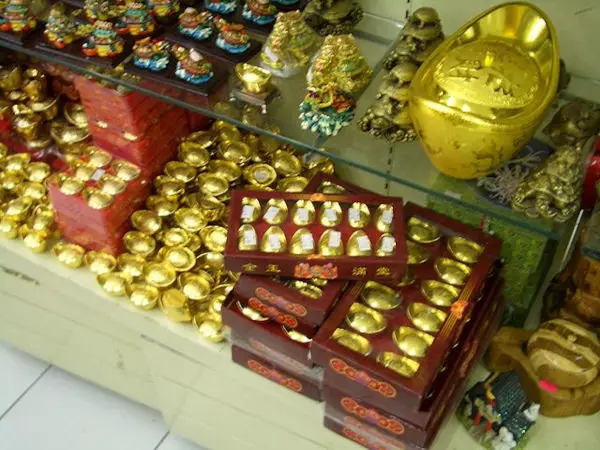
Yuanbao in Modern Finance
Today, while physical Yuanbao are no longer used as currency, their shape and symbolism continue to be reflected in various financial products and decorations associated with wealth.
For example, the term “Yuan” in contemporary Chinese currency (the Renminbi) translates to “round,” connecting the concept of wealth to the shape of coins. This historical link emphasizes the Yuanbao’s role as a foundational element in China’s monetary system.
In addition, the Yuanbao’s distinctive boat-like shape, is subtly reflected in various forms of Chinese money, particularly in the design of gold and silver bullion coins and commemorative coins.
These coins, often shaped or embossed with Yuanbao imagery, serve as both functional currency and symbolic representations of wealth. The Yuanbao is also featured on the packaging and design of gold bars sold by banks, further emphasizing its role as a potent symbol of financial fortune.
Yuanbao as a Representation of Wealth in Financial Institutions
Financial institutions in China, particularly banks and investment firms, frequently use the Yuanbao as a visual representation of wealth and stability. Its enduring association with prosperity makes it a natural choice for logos, branding, and promotional materials.
The Yuanbao symbol, often seen in bank advertisements or displayed in branches, is intended to convey the institution’s ability to protect and grow its clients’ wealth. The imagery of Yuanbao suggests financial security, trust, and the promise of future prosperity, which are key values in banking.
Additionally, some financial products, such as wealth management plans or investment portfolios, incorporate the Yuanbao symbol to represent growth and financial success.
The Yuanbao is more than a decorative element; it serves as a cultural touchstone that reinforces the idea of long-term wealth accumulation. Its appearance in financial contexts creates a sense of reassurance for clients, who associate the symbol with good fortune and reliable wealth management, linking traditional beliefs with modern economic goals.
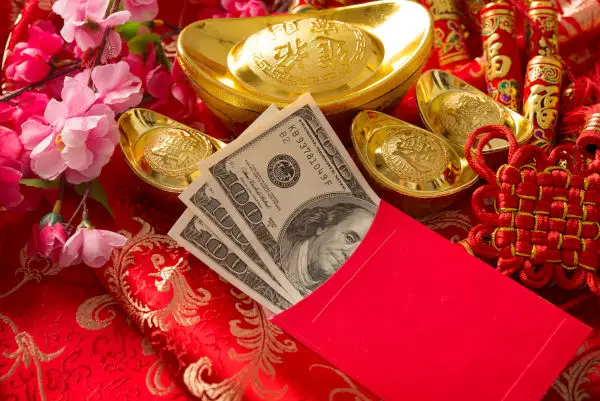
Banks also frequently use Yuanbao-themed items during major financial and cultural events, such as Chinese New Year or the launch of new products. These events often feature Yuanbao-inspired giveaways, such as gold-plated ingots or Yuanbao-shaped tokens, which clients can keep as symbols of good luck and financial well-being.
This practice not only reinforces the bank’s image as a wealth protector but also ties financial success to cultural heritage, creating a meaningful connection between traditional values and contemporary financial aspirations.
Collecting Yuanbao Ingots
Investing in Yuanbao ingots has gained popularity among collectors and investors alike, not only for their historical and cultural value but also for their financial potential. Traditionally made from gold or silver, Yuanbao ingots can be a sound investment, particularly as the value of precious metals continues to rise.
Authentic antique Yuanbao, especially from the Ming and Qing dynasties, are highly sought after and can command significant prices at auctions or in private sales. Collectors who acquire Yuanbao ingots view them as both a tangible connection to China’s rich cultural heritage and a stable investment in precious metals.
In addition to antique pieces, modern-day replica Yuanbao made from high-quality gold, silver, or jade are also available for investment. These contemporary ingots often hold their value due to the precious materials they are crafted from, making them a reliable option for those looking to diversify their investment portfolio with a culturally significant asset. Whether seeking historical artifacts or modern pieces, Yuanbao ingots offer a unique way to combine cultural appreciation with financial gain.
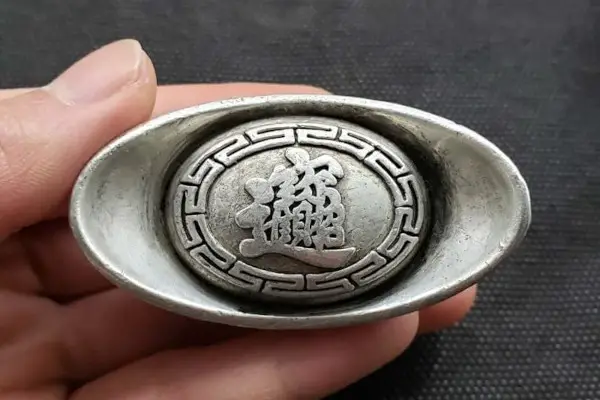
Tips for Buying Authentic Yuanbao Ingots
When buying authentic Yuanbao ingots, it’s essential to ensure that the piece is genuine and made from the material advertised. Here are some useful tips to guide your purchase:
- Verify the Seller: Only purchase from reputable dealers, whether you’re buying antique or modern Yuanbao. If possible, work with sellers who specialize in Chinese antiques or precious metal investments. Many trusted auction houses also sell Yuanbao ingots.
- Check for Authenticity Certificates: Many authentic Yuanbao ingots come with certificates of authenticity, especially if they are antiques or high-value replicas. These certificates help confirm the ingot’s origin, age, and material composition.
- Inspect the Metal Quality: For modern Yuanbao made from gold or silver, check the metal’s purity (e.g., 24-karat gold). For antique Yuanbao, you may need an expert to verify the metal quality and authenticity.
- Examine the Craftsmanship: Authentic Yuanbao typically feature intricate craftsmanship, including detailed engravings or marks that signify the era or region they were made in. Poorly made replicas often lack this fine detailing.
- Consult with Experts: If you’re purchasing a high-value or antique Yuanbao ingot, consider consulting a professional appraiser who specializes in Chinese antiques to verify its authenticity before completing the transaction.
Caring for and Preserving Your Yuanbao Ingot Collection
Proper care and preservation are crucial for maintaining the value and beauty of your Yuanbao ingot collection. Whether your collection consists of antique pieces or modern replicas, here are some key tips:
- Storage: Store your Yuanbao ingots in a dry, temperature-controlled environment. Humidity can cause silver to tarnish or damage delicate engravings, while extreme temperatures may affect the structural integrity of metal or jade ingots.
- Handling: Always handle Yuanbao ingots with clean, dry hands, and avoid touching them too often, especially antique pieces. Oils from your skin can tarnish or degrade the metal over time.
- Cleaning: For modern gold and silver Yuanbao, gentle cleaning with a soft cloth is often sufficient. Avoid harsh chemicals or abrasive materials. Antique Yuanbao should only be cleaned by professionals to avoid damaging their surface or craftsmanship.
- Display Protection: If you choose to display your collection, consider placing the ingots in a glass display case to protect them from dust, humidity, and accidental damage. For high-value antiques, you might opt for a more secure, lockable display to prevent theft or mishandling.
The Future of Yuanbao Ingot Collecting
The future of Yuanbao ingot collecting looks promising as interest in cultural artifacts continues to grow globally. As more people recognize the significance of these symbols of wealth, both collectors and investors are likely to seek out authentic pieces.
With advancements in technology, including online marketplaces and auction platforms, collectors now have greater access to Yuanbao ingots than ever before. However, this also means that potential buyers must remain vigilant against counterfeit items.
As the appreciation for Chinese culture expands worldwide, Yuanbao ingots may increasingly become sought-after collectibles, making them not only valuable investments but also cherished cultural artifacts that connect people to China’s rich heritage.

Yuanbao as Gifts
Yuanbao, or wealth ingots, hold significant cultural importance in Chinese society, particularly as gifts. Traditionally, Yuanbao symbolize not just monetary wealth but also the hope for prosperity and good fortune.
As such, they are often given during important life events and celebrations, conveying wishes for success and abundance to the recipient.
In Chinese culture, gifting Yuanbao is a way to express goodwill and positive intentions. The act of giving these symbolic ingots signifies a desire to share prosperity and blessings with others.
This practice aligns with the broader cultural values of generosity and community support, reinforcing the belief that wealth should be shared to foster collective prosperity.
Popular Occasions to Give Yuanbao
Yuanbao is commonly given on various festive occasions, including:
- Chinese New Year: During this time, it is customary to gift Yuanbao as a symbol of good luck and prosperity for the coming year. They may be presented in red envelopes along with other auspicious items.
- Weddings: Yuanbao are often included in wedding gifts to the newlyweds, symbolizing wishes for a prosperous and harmonious life together.
- Birthdays: Gifting Yuanbao on birthdays is a way to wish the celebrant a year filled with wealth and success.
- Housewarming Parties: When someone moves into a new home, presenting Yuanbao can be seen as a gesture of goodwill, wishing them prosperity in their new space.
How to Present a Yuanbao Gift for Maximum Symbolism
To present a Yuanbao gift effectively and maximize its symbolic value, consider the following tips:
- Use Red Envelopes: Presenting Yuanbao in red envelopes enhances their auspiciousness. The color red is associated with good luck and protection against evil spirits, making it an ideal choice for gifting.
- Accompany with Good Wishes: When giving Yuanbao, verbally express your wishes for prosperity and success for the recipient. This personal touch adds depth to the gift and reinforces its meaning.
- Choose Appropriate Timing: Timing can enhance the symbolism of your gift. For instance, giving Yuanbao during significant festivals like Chinese New Year or at life milestones such as weddings can amplify their positive impact.
- Include Other Auspicious Items: Consider pairing Yuanbao with other symbols of good fortune, such as oranges (representing wealth) or flowers (symbolizing growth), to create a more comprehensive gift that embodies abundance.

Yuanbao in Pop Culture
Yuanbao has made notable appearances in various movies and TV shows, often symbolizing wealth, prosperity, and good fortune. In many Chinese films, especially those centered around themes of martial arts or historical dramas, characters may be seen using or presenting Yuanbao to signify their status or wealth.
For instance, films featuring the God of Wealth, such as The God of Fortune series, prominently display Yuanbao as a central motif, reinforcing its cultural significance. In contemporary cinema, Yuanbao can also be found in comedic contexts, where characters might use them to attract luck or wealth in humorous situations.
This representation not only entertains but also educates audiences about the cultural importance of these symbols in everyday life. Additionally, television dramas often incorporate Yuanbao during festive episodes, especially around the Lunar New Year, showcasing traditional practices and beliefs surrounding wealth.
How Yuanbao Is Portrayed in Modern Chinese Media
In modern Chinese media, Yuanbao continues to be portrayed as a powerful symbol of wealth and prosperity. Advertisements and promotional materials frequently feature Yuanbao to evoke feelings of abundance and success.
For example, during the Lunar New Year season, many brands utilize imagery of Yuanbao to attract consumers by associating their products with good fortune.Social media platforms also see a surge in posts featuring Yuanbao during festive seasons.
Users share images of decorative Yuanbao, often accompanied by wishes for wealth and happiness. This digital representation helps keep the cultural significance of Yuanbao alive among younger generations while blending traditional symbolism with modern expression.
Yuanbao References in International Pop Culture
Yuanbao has transcended its traditional roots and made appearances in international pop culture as well. Video games such as Lucky Yuanbao incorporate the ingot into gameplay mechanics, where players can interact with virtual representations of Yuanbao to increase their winnings.
This not only introduces players to the concept of Yuanbao but also ties it to themes of luck and prosperity that resonate across cultures.In addition, references to Yuanbao can be found in various animated series and films that explore Asian cultures. These portrayals often highlight the ingot’s significance as a symbol of wealth, making it relatable to global audiences while educating them about its cultural background.
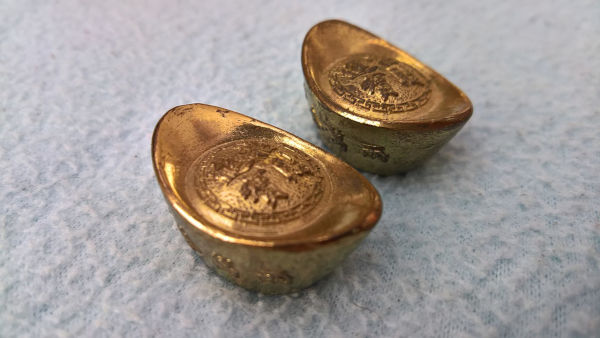
Yuanbao as a Motivational Symbol
Beyond its historical and cultural significance, Yuanbao ingots can also serve as a powerful motivational symbol for achieving financial goals.
How Yuanbao Can Inspire Financial Goals
- Visualization: The image of a Yuanbao ingot can be a powerful visualization tool, helping you imagine the success and prosperity you desire.
- Inspiration: The symbol of the ingot can inspire you to take action and pursue your financial goals with determination.
- Focus: By focusing on the Yuanbao symbol, you can stay focused on your financial objectives and avoid distractions.
Using Yuanbao as a Daily Reminder of Prosperity
- Displaying a Yuanbao: Place a miniature Yuanbao ingot or a picture of one in a prominent place where you can see it daily.
- Meditation: Use the Yuanbao symbol as a focal point during meditation, visualizing financial abundance and success.
- Affirmations: Combine the Yuanbao symbol with positive affirmations to reinforce your belief in your financial goals.
Yuanbao in Vision Boards and Manifestation Practices
- Creating a Vision Board: Include images of Yuanbao ingots on your vision board to represent financial success and prosperity.
- Manifestation Rituals: Use the Yuanbao symbol in manifestation rituals, such as lighting a candle and visualizing your financial goals.
Cultural Differences: Yuanbao in China vs. Other Asian Cultures
The Yuanbao, or wealth ingot, is primarily associated with Chinese culture, where it symbolizes prosperity and good fortune. However, its influence extends to other Asian cultures, albeit with variations in significance and representation. In China, Yuanbao is deeply embedded in traditions, especially during festivals like the Lunar New Year, where it is used as a decorative motif and a gift to convey wishes for wealth.
In contrast, in Taiwan, the cultural significance of Yuanbao is reflected in religious practices, such as at the Yuanbao Temple, dedicated to the Taoist deity Baosheng Dadi. Here, Yuanbao symbolizes not only wealth but also spiritual abundance and protection. The temple’s festivals often incorporate Yuanbao as offerings, emphasizing its role in both material and spiritual prosperity.
Other Asian cultures may recognize similar symbols of wealth but often use different forms or interpretations. For example, in Vietnam, the concept of wealth during the Lunar New Year is represented through gold-plated items and decorations that serve a similar purpose to Yuanbao but are culturally distinct.
Thus, while Yuanbao is a prominent symbol in Chinese culture, its representation and significance can vary across different Asian societies.
Comparison of Yuanbao and Other Cultural Symbols of Wealth
| Symbol | Culture | Symbolism | Usage |
| Yuanbao | Chinese | Wealth and prosperity | Gifts, feng shui |
| Maneki-neko | Japanese | Good luck and financial success | Decor in businesses and homes |
| Golden Fish | Vietnamese | Abundance and fertility | Decorations in festivals |
| Elephant | Indian | Wisdom and wealth | Used in rituals and home decor |
How Yuanbao Symbolism Differs Across Various Chinese Regions
Within China itself, the symbolism of Yuanbao can differ significantly across various regions. In southern China, particularly in areas like Guangdong and Fujian, Yuanbao is often associated with local customs and practices that emphasize community prosperity. Here, it may be more common to see Yuanbao incorporated into local festivals and rituals that celebrate agricultural abundance and familial wealth.
Conversely, in northern regions like Beijing, the focus may be more on the historical aspects of Yuanbao as an ancient currency used during the Ming and Qing dynasties. The emphasis here might be on collecting authentic pieces or replicas for their historical value rather than solely for their symbolic wealth.
Additionally, regional dialects and folklore can influence how Yuanbao is perceived. In some areas, local legends may enhance its significance as a protective charm against misfortune or as a means to attract good luck in business ventures. This regional diversity underscores the adaptability of Yuanbao symbolism within the broader context of Chinese culture.
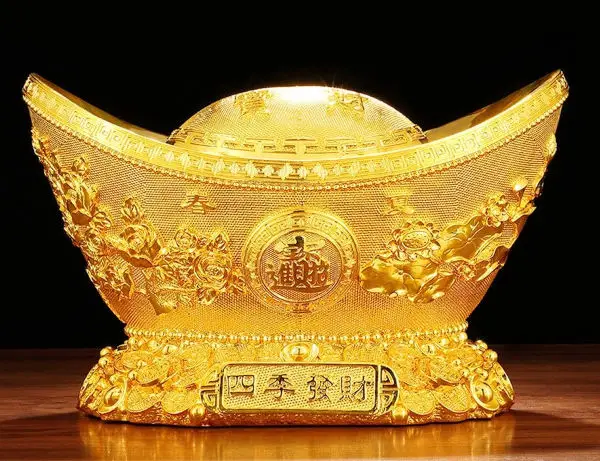
Final Thoughts
The Yuanbao, or wealth ingot, is a multifaceted symbol deeply rooted in Chinese culture, representing prosperity, abundance, and good fortune. Its rich history spans from ancient currency to a revered icon in modern practices, influencing various aspects of life, including art, finance, and personal motivation.
As we explore the significance of Yuanbao in celebrations, religious practices, and even global pop culture, it becomes clear that its influence extends beyond mere material wealth.
Whether as a decorative piece in homes, a cherished gift during special occasions, or a motivational symbol in personal finance practices, Yuanbao continues to inspire individuals to pursue their aspirations for prosperity.
As the world becomes increasingly interconnected, the enduring legacy of Yuanbao serves as a reminder of the universal desire for abundance and success, bridging cultural divides and fostering appreciation for the values it embodies.
Want to learn more about Feng Shui? Take a look at these Courses and Books – Aff.link
Stay in Touch
 Join our newsletter by using the forms on this website or click here!
Join our newsletter by using the forms on this website or click here! Follow us on Google News
Follow us on Google News Follow us on Facebook
Follow us on Facebook
Featured image from Depositphotos.com

